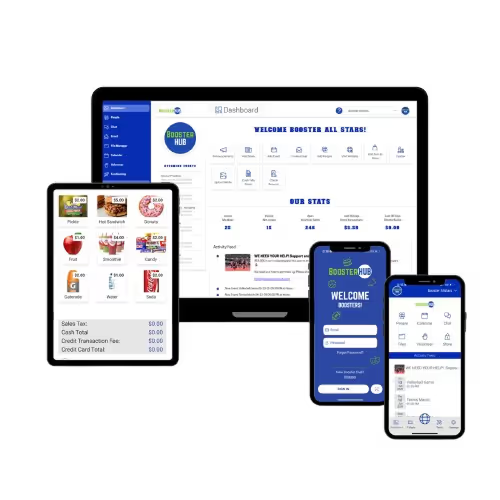
What Should Appear on a Donation Receipt: Your Essential Guide to Proper Thank-You Documentation
Creating compliant, professional receipts that protect donors and your organization
Donation receipts aren't exactly the most exciting part of running a booster club, but they're absolutely critical for keeping your donors happy, your organization compliant, and your 501(c)(3) status secure.
Think of donation receipts as your organization's formal "thank you" that also happens to be a legal document. When done right, they protect both your donors and your booster club while demonstrating the professionalism that builds long-term trust and support. Ready to master the art of receipt creation that keeps everyone happy and the IRS satisfied?
Why Proper Receipts Matter More Than You Think
Here's what many booster clubs don't realize: donation receipts aren't just nice gestures – they're legal requirements that protect your donors' ability to claim tax deductions and your organization's nonprofit status. According to the IRS, failing to provide proper receipts can result in donors losing their tax deductions AND your organization facing penalties.
But beyond legal compliance, great donation receipts are stewardship tools that reinforce your professionalism, express gratitude effectively, and create positive donor experiences that encourage future giving!
IRS Requirements: The Non-Negotiables
For Donations Under $250
Required Information:
- Organization name and complete address
- Date of contribution (when the donation was received)
- Amount of cash contribution in dollars
- Description of non-cash contribution (if applicable)
- Statement about tax-deductibility and your 501(c)(3) status
Simple Format Example: "Thank you for your $50 donation to Memorial High School Booster Club (EIN: 12-3456789), located at 123 School Street, Springfield, IL 62701. Your contribution was received on March 15, 2025. This donation is tax-deductible to the extent allowed by law."
For Donations of $250 or More
Everything above PLUS:
- Written acknowledgment from the organization (email counts!)
- Statement of whether goods or services were provided in exchange for the contribution
- Description and good faith estimate of value of any goods/services provided
- Clear statement if no goods or services were provided
Enhanced Format Example: "Thank you for your generous $500 donation to Memorial High School Booster Club (EIN: 12-3456789), located at 123 School Street, Springfield, IL 62701. Your contribution was received on March 15, 2025. No goods or services were provided in exchange for this contribution. This donation is tax-deductible to the extent allowed by law."
Essential Elements Every Receipt Must Include
Organization Identification
Your Official Name Use your exact legal organization name as registered with the IRS, not abbreviations or casual names:
- ✓ "Memorial High School Athletic Booster Club"
- ✗ "Memorial Boosters" or "MHSBC"
Complete Address Include your full mailing address:
- Street address or P.O. Box
- City, state, and ZIP code
- This should match your IRS registration
EIN (Employer Identification Number) Your federal tax ID number must appear on receipts for donations over $75 or when specifically requested by donors.
Donation Details
Exact Contribution Amount
- Use specific dollar amounts: "$75.00" not "approximately $75"
- For non-cash donations, describe items without assigning value (unless you're qualified to appraise)
- For mixed donations, separate cash and non-cash portions
Date of Receipt
- Use the date your organization actually received the donation
- Not the date the check was written or the pledge was made
- Not the date you processed or deposited the donation
Legal Language
Tax-Deductibility Statement Required language options:
- "This donation is tax-deductible to the extent allowed by law."
- "This organization is exempt from federal income tax under section 501(c)(3) of the Internal Revenue Code."
- "Donations to this organization are deductible under section 170 of the Internal Revenue Code."
Goods and Services Disclosure Must clearly state either:
- "No goods or services were provided in exchange for this contribution."
- OR provide detailed description and estimated value of any benefits received
Special Situations and Requirements
Event Tickets and Benefits
When Donors Receive Something in Return If donors receive dinner, auction items, or other benefits:
- Calculate fair market value of benefits received
- Subtract benefit value from total payment
- Only the excess is tax-deductible
Example: "Thank you for your $100 gala ticket purchase. The fair market value of dinner and entertainment provided was $35. Therefore, $65 of your payment is tax-deductible."
Non-Cash Donations
Items and Equipment
- Describe items without assigning monetary value
- Let donors determine fair market value for their taxes
- Note condition if relevant (good, fair, poor)
Services and Professional Time
- Generally NOT tax-deductible for the donor
- Still acknowledge gratefully, but clarify tax treatment
- "Thank you for donating 10 hours of accounting services. Please consult your tax advisor regarding deductibility of donated services."
Memorial and Tribute Gifts
Special Considerations
- Honor the tribute appropriately in receipt language
- Provide notification information if donor requests family notification
- Maintain privacy of donation amount in family notifications
Timing Requirements
When Receipts Must Be Provided
Donations Under $250: By January 31st of the year following the donation Donations $250 and Above: Before donor files tax return OR by January 31st following donation, whichever is earlier
Best Practice: Provide receipts within 48 hours of receiving donations to demonstrate professionalism and ensure compliance.
Year-End Considerations
December 31st Deadline
- Donations must be RECEIVED by December 31st to count for that tax year
- Postmark dates don't matter – actual receipt dates do
- Online donations count when processed, not when submitted
Technology and Automation
Digital Receipt Solutions
Email Receipts
- Meet IRS requirements fully when properly formatted
- Provide immediate acknowledgment and donor satisfaction
- Easier to store and track than paper receipts
- Include PDF attachments for donor record-keeping
Automated Systems
- Online donation platforms can generate compliant receipts automatically
- Donor management software maintains records and generates year-end summaries
- Integration capabilities sync with accounting and reporting systems
Record Keeping Requirements
Documentation You Must Maintain
- Copies of all receipts issued
- Bank records showing deposit dates and amounts
- Donor communications and any special instructions
- Fair market value calculations for benefit events
Your Receipt Excellence Action Plan
Ready to master donation receipt creation?
- Create standardized templates for different donation types and amounts
- Verify your legal information including exact organization name and current EIN
- Set up automated systems for immediate receipt generation when possible
- Train volunteers on proper receipt requirements and timing
- Establish quality control processes to catch errors before receipts are sent
- Create filing systems for maintaining required records
- Schedule annual review of receipt processes and legal requirements
The Ultimate Receipt Victory
Proper donation receipts might not be the most glamorous part of running a booster club, but they're absolutely essential for maintaining donor trust, legal compliance, and organizational professionalism. When your receipts are accurate, timely, and complete, you protect your donors' tax benefits while demonstrating the kind of attention to detail that builds confidence in your organization.
Remember, every donation receipt is an opportunity to thank supporters professionally while protecting both their interests and your organization's nonprofit status. The extra effort you put into creating proper receipts pays dividends in donor satisfaction, legal protection, and organizational credibility.
Getting receipts right isn't just about following rules – it's about showing respect for your donors and maintaining the trust that makes ongoing support possible. When people know they can count on your organization to handle their contributions properly, they're much more likely to give again and recommend you to others!
Ready to streamline your donation receipt process? Visit BoosterHub.com to explore donor management tools that automate compliant receipt generation and maintain proper records.
Simplify Communications from App to Website




.avif)